The Code of Putinism
Teacher-scholar Brian Taylor shows how Putin's mentality shapes Russian politics
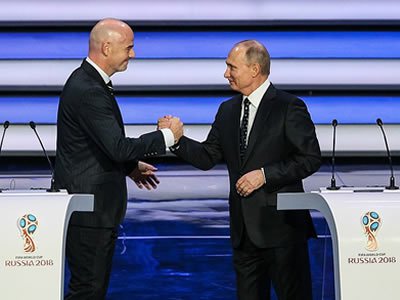
The running joke among foreign analysts is that, despite Russia’s dismal FIFA ranking, it may emerge as the real winner of the World Cup.
Between now and July 15, millions of fans will flock to various Russian cities, including Moscow, St. Petersburg and Sochi, to watch their national teams compete for soccer’s Holy Grail. Billions more will watch the action on television.
Although Team Russia has dialed up some surprise victories, President Vladimir Putin, who has invested more than $13 billion on stadia and infrastructure, seems to have more than soccer on his mind. Those close to him insist he is using the World Cup to foment feelings of national pride, while enhancing his popular standing.
“The World Cup is more important to Putin than you think,” says Brian D. Taylor, professor and chair of political science in the Maxwell School and the College of Arts and Sciences (A&S). “A lot has happened to Russia since 2010, when Putin won the bid to host the tournament—his re-election, the annexation of Crimea, Russian’s intervention in the Syrian war. The games come at a time when Russia’s standing in the world is precariously low.”
Taylor speaks with authority. A scholar of Russian and comparative politics, he is the author of “The Code of Putinism” (Oxford University Press, 2018), a new book about how Putin’s mentality shapes his country’s politics. As Russia teeters on the brink of economic stagnation and international ostracism, Taylor argues that mega events, such as the World Cup and the Winter Olympics in Sochi, four years earlier, have strong political ramifications. “Merely hosting the World Cup is a major coup. It shows Russia still matters,” he says.
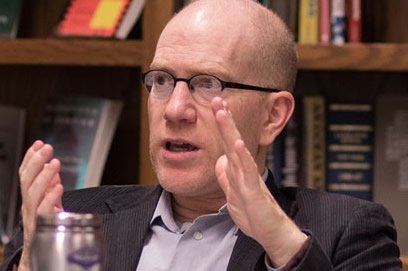
Most of Taylor’s career has been a warm-up for “The Code of Putinism,” which he began researching five years ago. Drawing on hundreds of interviews and speeches, Taylor thinks Putin’s messianic vision could be Russia’s undoing.
Speaking by phone from his office in Eggers Hall, the bespectacled, clean-cut author riffs on how the code motivates Putin’s decisions and influences the way he and his allies view the world. “The code of Putinism has molded Russia’s political system, along with its economy and foreign policy, since Putin’s election as president in 2000,” says Taylor, who also authored “State Building in Putin's Russia: Policing and Coercion After Communism” (2011) and “Politics and the Russian Army: Civil-Military Relations, 1689-2000” (2003), both from Cambridge University Press. “Key factors of Russian politics—authoritarianism, Putin’s reliance on a small group of friends and associates, state domination of the economy, an assertive foreign policy—owe their existence to the code.”
Golfo Alexopoulos, director of the University of South Florida (USF) Institute on Russia, praises “The Code of Putinism” for exposing Putin’s worldview, leadership style and method of governing. “It is critical for Americans to understand Russian thinking and motives, so we can formulate an intelligent Russia policy that advances democracy and global security,” says Alexopoulos, also a history professor at USF. “Dr. Taylor has a deep understanding of contemporary Russia and its historical and cultural legacies.”
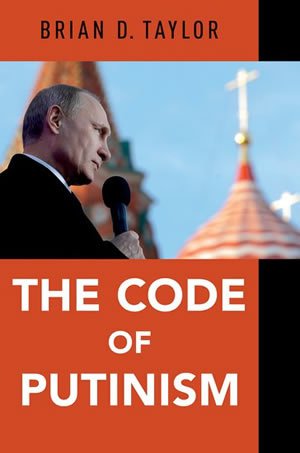
The basic notion of the code was inspired by Max Weber, an early 20th-century German sociologist. He believed that people are motivated by not only rational self-interest, but also ideas, habits and emotions. Taylor builds on this insight to analyze Putin’s mentality.
In Putin’s case, ideas include statism, anti-Westernism, conservatism and anti-liberalism. “Putin is a great power statist who believes in a strong Russia at home and abroad. He also is a conservative, prioritizing the group over the individual, as well as tradition over change and reform,” says Taylor, who earned a Ph.D. in political science from MIT. “Putin’s Russia is a ‘service state’—not one that provides services to its citizens, but one that expects citizens to serve it.”
Habits are unconscious reactions to stimuli, rather than deeply considered ideas. Putin’s key impulses involve control, order and loyalty. “Many of his habits were cemented by the time he joined the KGB in the ’70s,” Taylor says. “He and his aides made their careers as bureaucrats, not politicians, so they are used to hierarchical organizational structures. Witness Putin’s early presidential slogan: the ‘vertical of power.’”
Emotions often get short shrift from social scientists trying to decipher political behavior, but Taylor insists they are integral to Russian decision-making. “Emotions relate to how Putin sees Russia,” he says. “They include feelings of resentment, vulnerability and loss of status, stemming from Russia’s perceived humiliation after the Cold War. Putin believes it is time to redress these feelings and gain back the respect of the world.”
That the Putinist code is making inroads into classrooms is proof Taylor is onto something. Lauren McCarthy, associate professor of legal studies at the University of Massachusetts Amherst, says “The Code of Putinism” is a must-read for anyone wanting to understand how Russia operates. “Once you immerse yourself in the habits, emotions and ideas that make up Putinism, everything that happens in Russia makes more sense,” says McCarthy, who teaches a course on Russian politics, law and society. “My students [who study the code] walk away feeling like they know how to interpret Russian politics and Putin, himself.”
Thomas Keck thinks Taylor is uniquely qualified to assess the return of Global Russia. “He is a leading expert on Russian politics, particularly the state’s military and law enforcement apparatus,” says Keck, professor of political science and the Michael O. Sawyer Chair of Constitutional Law and Politics in the Maxwell School and A&S. “Brian is a popular but demanding teacher, as evidenced by his courses on Russian politics and civil-military relations. His book could not be more relevant.”
Not since the Cold War has interest in Russia bordered on obsession, if not paranoia. Doubtless that the World Cup will help burnish the country’s newfound swagger.
Russia as a thriving geopolitical powerbroker flies in the face of its usual depiction as a landmass on life support. Yet, the threat of the West isolating Russia for its military interventions in Ukraine and alleged meddling with other countries’ elections is real.
“[The Code of Putinism’] argues that while Putinism may not be a full-fledged ideology like Soviet Marxism-Leninism, it should nevertheless be understood as a coherent regime type that can be emulated by autocrats in other world settings,” says Stephen E. Hanson, vice provost for international affairs at William & Mary.
Adds David E. Hoffman, a Pulitzer Prize-winning author and former Moscow bureau chief for The Washington Post: “It is a penetrating and incisive X-ray of Putin’s rule, essential reading for anyone who wants to decode the central nervous system of power in Russia today. This book is like possessing a key to the Kremlin.”
Admittedly, the 65-year-old Putin cuts a dashing figure, with his penchant for judo and posing shirtless. Stereotypes can be misleading, and one needs to dig deeper to understand what drives such displays of hyper-masculinity—and Putin’s thought processes, in general.
Enter Taylor, who explains that Putin usually is lumped into one of two groups. On the one hand, he is seen as a pragmatist, taking in the world around him and responding to short-term needs. In this view, there is no guiding vision. On the other extreme, he is depicted as a strident nationalist, with a specific ideology about Russia and its place in the world.
Taylor says each approach, by itself, is inaccurate. “The code is somewhere in the middle, with Putin guided by a more complex set of motivations,” he adds. “That’s where Weber’s ideas, habits and emotions come into play.”
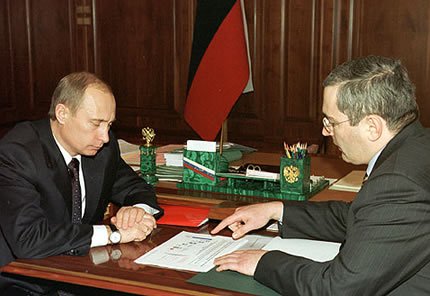
Scholars agree that, for all Putin’s heavy-handedness, he is often misunderstood. Western politicians often portray him as a master strategist, outwitting his opponents at every turn. Russians, including exiled business leader Mikhail Khodorkovsky, claim Putin’s fearsome reputation is more myth than reality—that his control inside Russia is less than what outsiders think.
“Most people view Putin as an ambitious nationalist, trying to conquer as much territory as possible,” says Taylor, who came to Syracuse in 2004, after a faculty stint at the University of Oklahoma. “In reality, he and other Russian leaders believe they are on the defensive. They think that, after decades of humiliation by the West, they need to stand up for themselves in the world.”
Another misconception is that Putin is a thief, out to enrich himself and his cronies. While kleptocratic behavior exists among Russian elite, Taylor considers it a byproduct, not the fundamental purpose, of Putin’s presidency.
“A kleptocrat is someone who loots resources at the expense of public services or institutional building,” Taylor says. “Yes, there is corruption in the Kremlin, and Russia is often misruled, [as evidenced by its] weak institutions and poor public services. Putin wants to ‘Make Russia Great Again,’ to borrow a phrase, and to respond to perceived humiliation by the West. Why annex Crimea or bomb Syria, if your only goal is to enrich yourself? This puts your assets, especially those hidden in the West, in danger.”

Sharon Werning Rivera, associate professor of government at Hamilton College, thinks part of the answer lies in “The Code of Putinism.” She credits Taylor for providing an important corrective to certain scholarly views of Putin as guided by rational calculations and pragmatism. “With his customary attention to detail, careful and balanced assessments and extensive use of source material, Brian describes how the operating code of ideas, habits, and emotions shared by Putin and his close associates is key to understanding Putin’s Russia,” Rivera adds.
Henry E. Hale, professor of both political science and international affairs at The George Washington University, echoes these sentiments: “Brian Taylor is one of the world’s top experts on Russia’s ‘force agencies’ and their place in Russian politics. His book could become the definitive scholarly work on how Russia’s leadership operates in practice, after two decades of Putin’s dominance.”
Says Taylor, “To be clear, the code is not Putin’s, but is the code of Putinism. … Putin obviously is the most important person in the system and is its central decision-maker, but he is not alone. The code is shared by everyone on his team—people he has known a long time and implicitly trusts.”
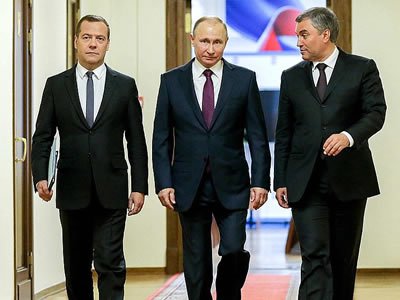
Among them is Vyacheslav Volodin, a former aide who famously suggested his boss and Russia were synonymous. “No Putin, no Russia,” he told a think tank in Sochi, regarding the country’s domestic policies. Delivered on the heels of Russia’s invasion of the Crimean peninsula, Volodin’s comments helped set the tone for Putin’s 2018 re-election, reminding the world that the leader had not lost any truck at home. (In March, Putin easily won his second consecutive and fourth overall term, making him Russia’s longest-serving ruler since Stalin.) “Any attack on Putin is an attack on Russia,” Volodin warned.
Such rhetoric is significant, Taylor says, because it suggests Putin is above the law. “A successful country is one whose institutions are stronger or higher than its leader,” he says. “If it’s the other way around, the country may not function properly. Russia is on borrowed time.”
Valerie Sperling, professor and chair of political science at Clark University in Massachusetts, commends Taylor for providing a nuanced and compelling interpretation of Putin’s presidency. “The book is ambitious and timely, with a convincing argument,” she says. “It is a theoretically grounded analysis of Putinism that explains why the regime has become increasingly authoritarian over time.”
Thus, “The Code of Putinism” is as cautionary tale—not just for Russia, but for other geopolitical players, large and small.
When asked if such a code ultimately benefits Russia, Taylor demurs. “Russia’s economy is increasing less than one percent a year, compared to the early 2000s, when rising oil prices bolstered annual growth to six to seven percent,” he says. “Putin’s authoritarianism is becoming self-defeating, the more Russia punches above its weight.”
Taylor’s considerable expertise in Soviet and Russian politics makes for lively reading, opines Cornell’s Matthew Evangelista. “No one is better placed than Brian Taylor to interpret the significance of Vladimir Putin’s rule for Russia and the world,” says the President White Professor of History and Political Science, who also directs the Judith Reppy Institute for Peace and Conflict Studies. “His expert knowledge and sound judgement of contemporary Russia is founded on years of teaching and studying Putin’s Soviet and Tsarist predecessors.”
Fellow Cornellian Valerie Jane Bunce, the Aaron Binenkorb Professor of International Studies and Professor of Government, says Taylor succeeds by dint of hard work and expertise. “He is a rare and welcome example of a scholar who knows how authoritarian regimes work and how authoritarian rulers operate,” Bunce adds.
Taylor takes the praise in stride, letting his work speak for itself. “Regardless of one’s political affiliation, the reader should come away with a deeper appreciation of what’s going on in Russia, beyond coverage of election interference or the World Cup,” he concludes. “Putin is a complex figure, and it is in our best interest to understand the mentality of the man behind the myth.”
